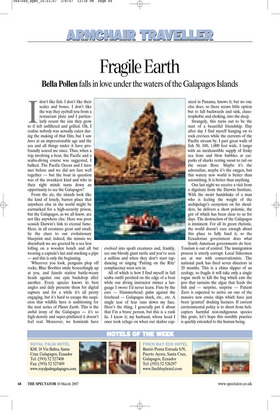Fragile Earth
Bella Pollen falls in love under the waters of the Galapagos Islands Idon’t like fish. I don’t like their scales and bones. I don’t like the way they eyeball you from a restaurant plate and I particularly resent the size they grow to if left unfilleted and grilled. Oh, I realise nobody was actually eaten during the making of that film, but I saw Jaws at an impressionable age and the sea and all things under it have profoundly scared me since. Thus, when a trip involving a boat, the Pacific and a scuba-diving course was suggested, I balked. The Pacific Ocean and I have met before and we did not fare well together — but the boat in question was of the swankiest kind and who in their right minds turns down an opportunity to see the Galapagos?
From the air, the islands look like the kind of lonely, barren place that anywhere else in the world might be earmarked for a high-security prison, but the Galapagos, as we all know, are not like anywhere else. Here was poor seasick Darwin’s link to eternal fame. Here, in all creatures great and small, lie the clues to our evolutionary blueprint and, indeed, the minute we disembark we are greeted by a sea lion lolling on a wooden bench and all but wearing a captain’s hat and smoking a pipe — and this is only the beginning.
Wherever you look, penguins plop off rocks, Blue Boobies smile beseechingly up at you, and lizards station battle-weary heads against one epic backdrop after another. Every species knows its best angles and duly presents them for digital capture and for a while it’s all pretty engaging, but it’s hard to escape the suspicion that wildlife here is auditioning for the next series of Planet Earth. This is the awful irony of the Galapagos — it’s so high-density and super-pixillated it doesn’t feel real. Moreover, we hominids have evolved into spoilt creatures and, frankly, see one bloody giant turtle and you’ve seen a million and when they don’t start tapdancing or singing ‘Putting on the Ritz’ complacency soon sets in.
All of which is how I find myself in full scuba outfit perched on the edge of a boat while our diving instructor mimes a language I swore I’d never learn. Fists by the ears — Hammerhead; palm against the forehead — Galapagos shark, etc., etc. A single tear of fear runs down my face. Here’s the thing, I generally put it about that I’m a brave person, but this is a rank lie. I know it; my husband, whose head I once took refuge on when our skidoo cap sized in Panama, knows it; but no one else does, so there seems little option but to fall backwards and sink, claustrophobic and choking, into the deep.
Strangely, this turns out to be the start of a beautiful friendship. Day after day I find myself hanging on to rock crevices while the currents of the Pacific stream by. I part great walls of fish 50, 100, 1,000 feet wide. I tango with an inexhaustible supply of frisky sea lions and blow bubbles at carparks of sharks resting snout to tail on the ocean floor. Maybe it’s the adrenaline, maybe it’s the oxygen, but this watery new world is better than astonishing. It is better than anything.
Our last night we receive a visit from a dignitary from the Darwin Institute. With the moist handshake of a man who is feeling the weight of the archipelago’s ecosystem on his shoulders, he delivers a short polemic, the gist of which has been clear to us for days. The destruction of the Galapagos is imminent. For all its green rhetoric, the world doesn’t care enough about this place to fully fund it, so the Ecuadorian government does what South American governments do best. Tourism is out of control. The immigration process is utterly corrupt. Local fishermen are at war with conservationists. The national park has fired seven directors in 20 months. This is a china slipper of an ecology, so fragile it will take only a single rogue moth to kill the bug which eats the poo that sustains the algae that feeds the fish and — surprise, surprise — Patient Zero is expected to arrive on one of the massive new cruise ships which have just been ‘granted’ docking licences. If current environmental policy is to shoot from helicopters harmful non-indigenous species like goats, let’s hope this sensible practice is quickly extended to the human being.


























































































 Previous page
Previous page